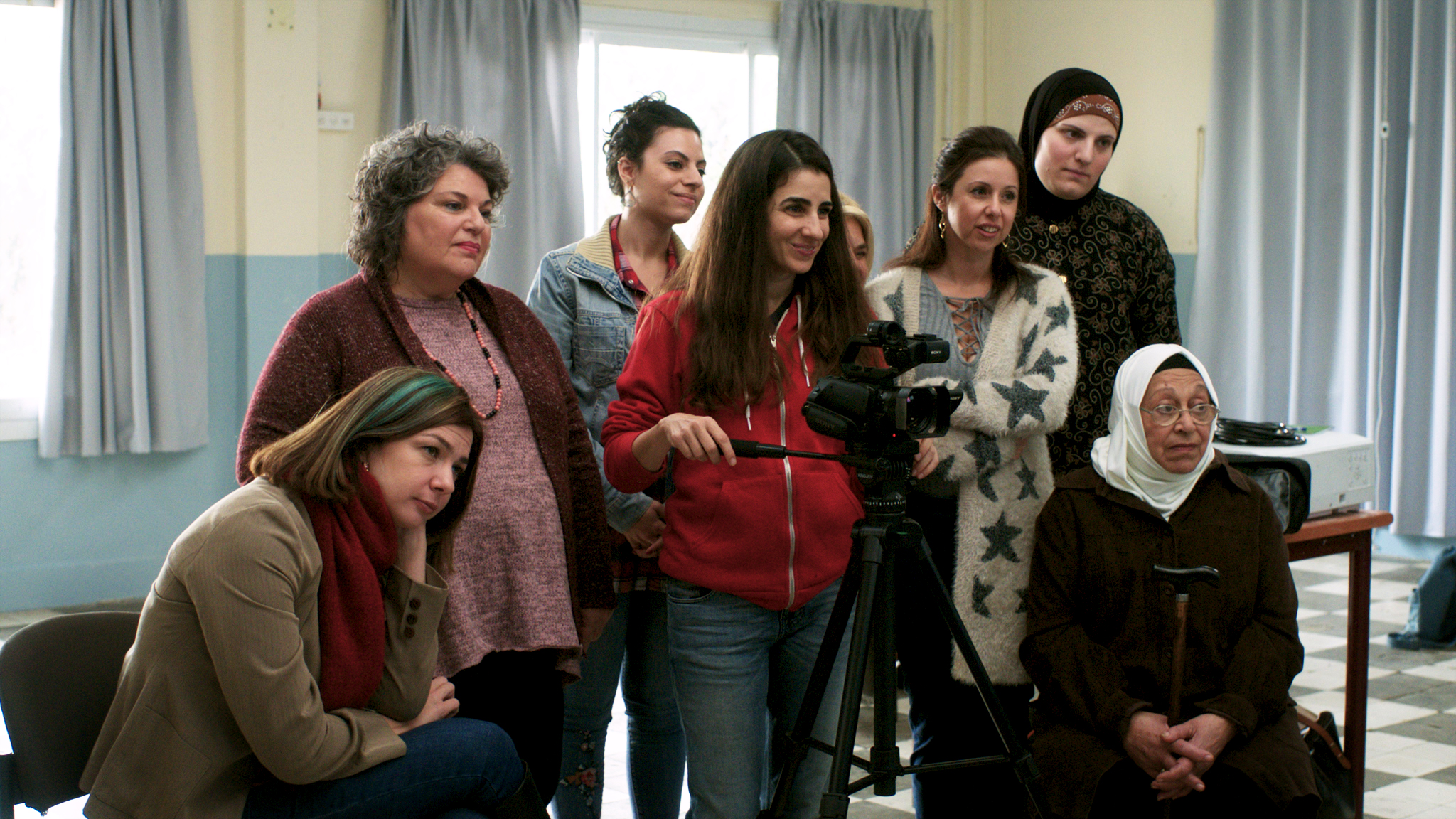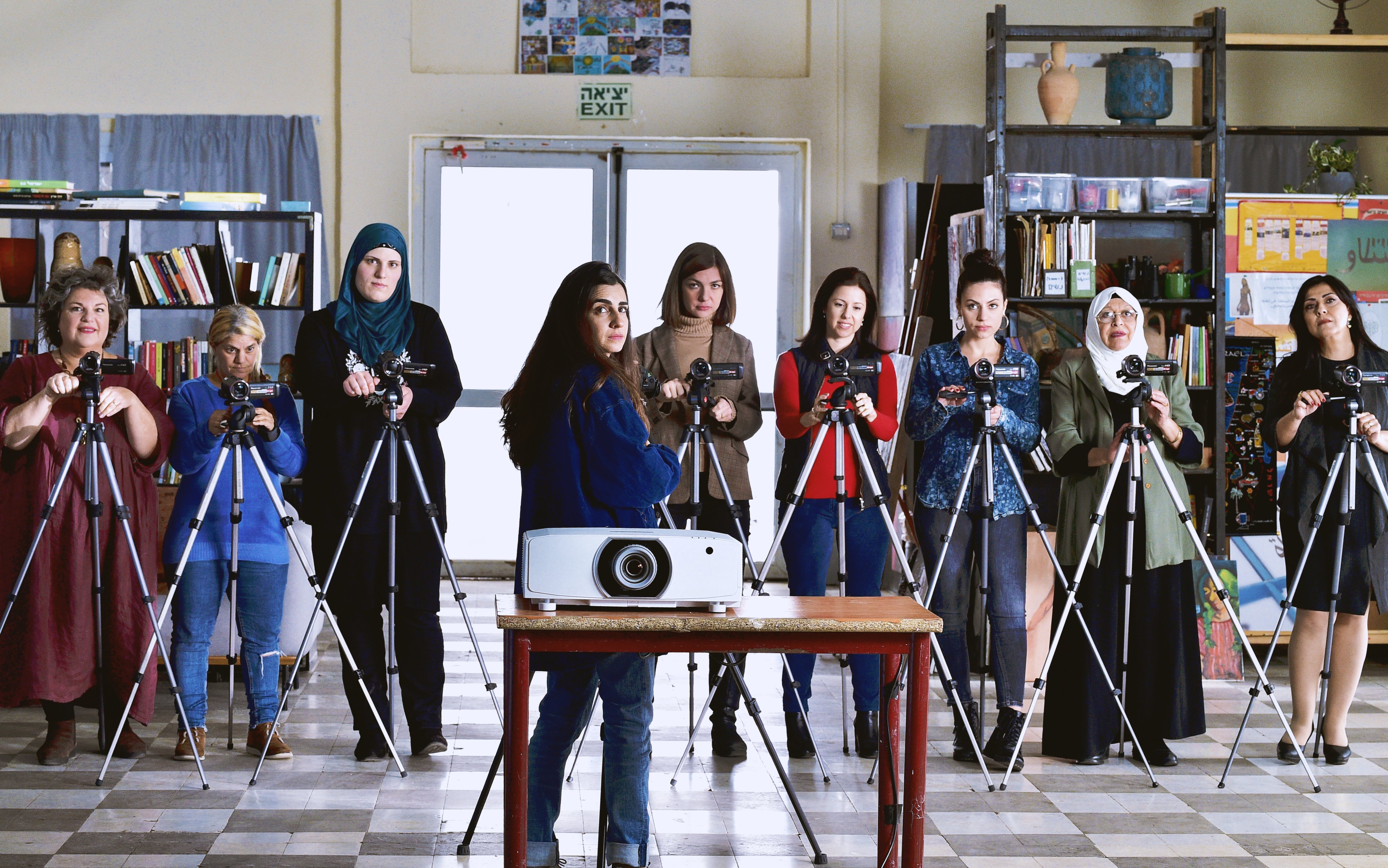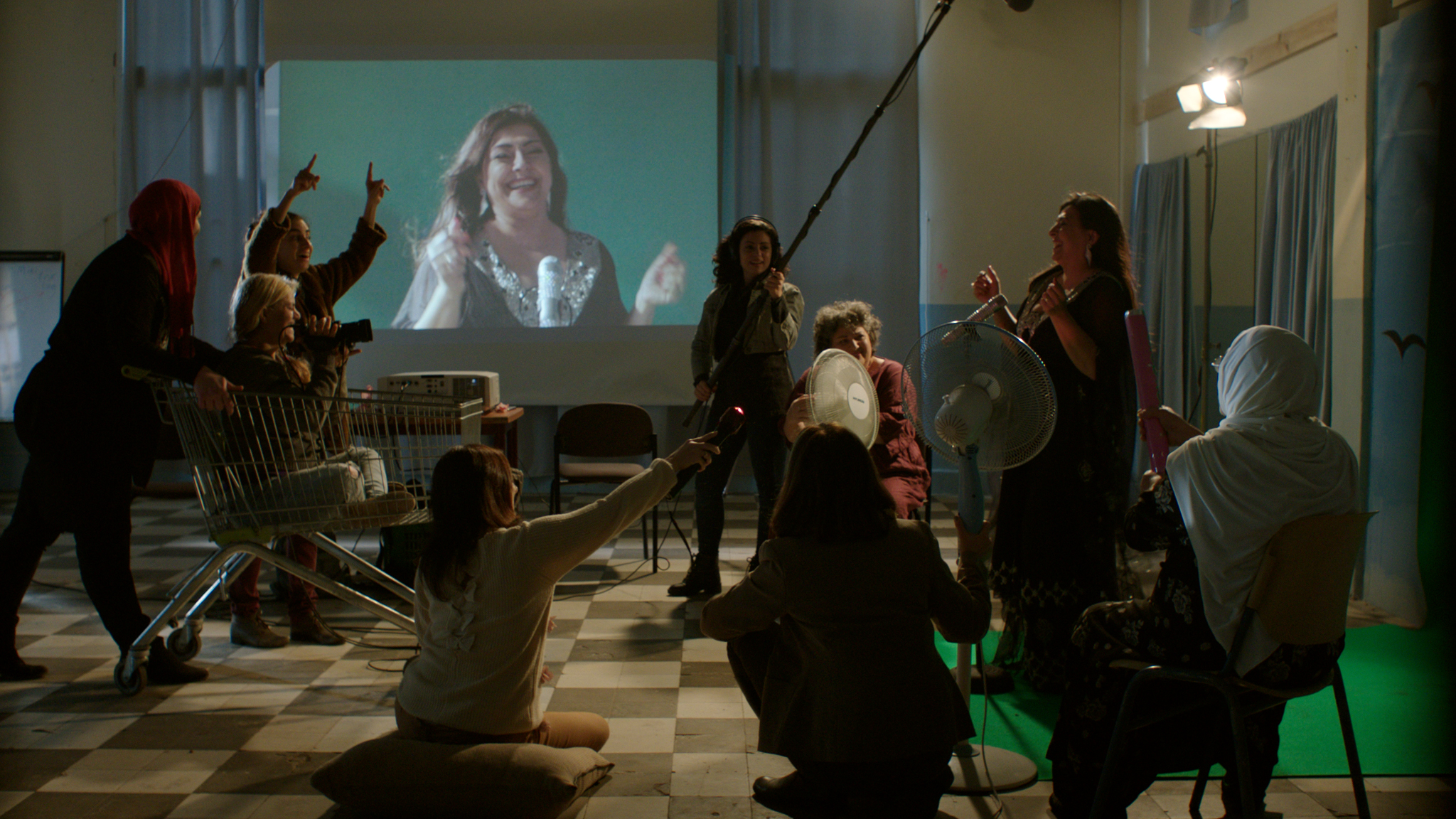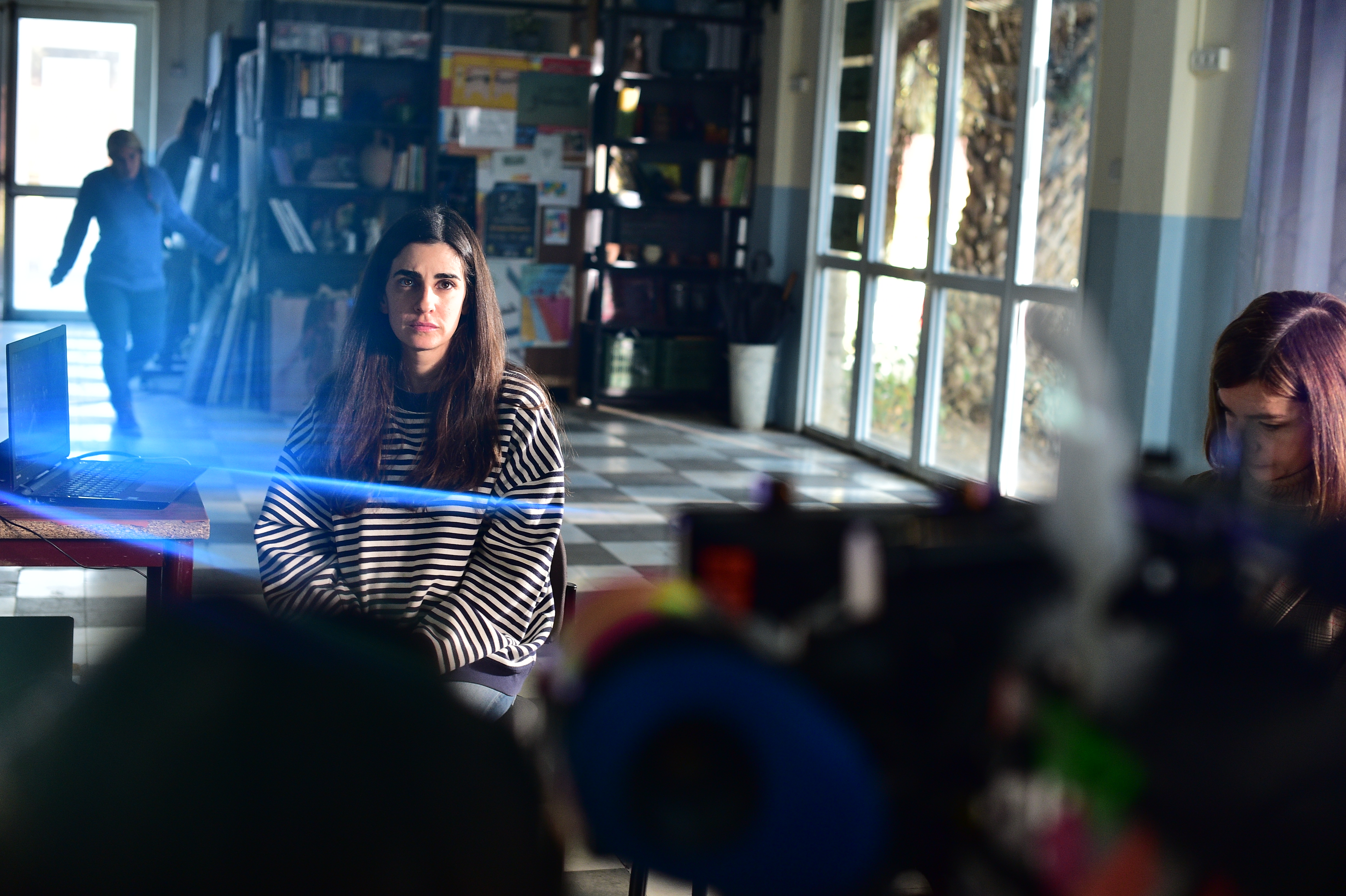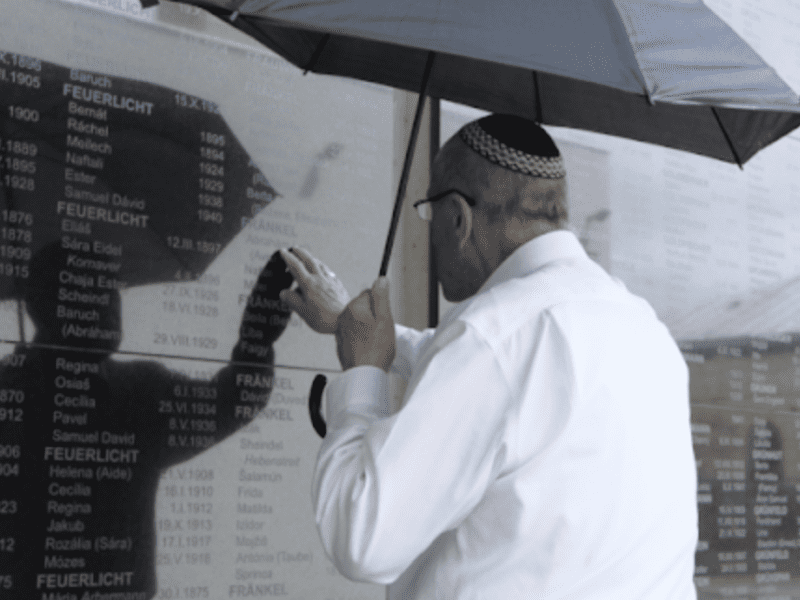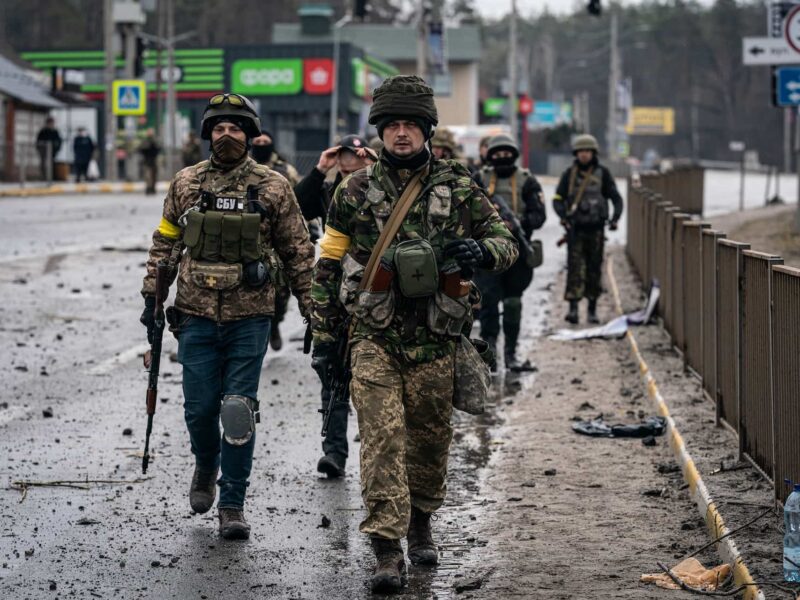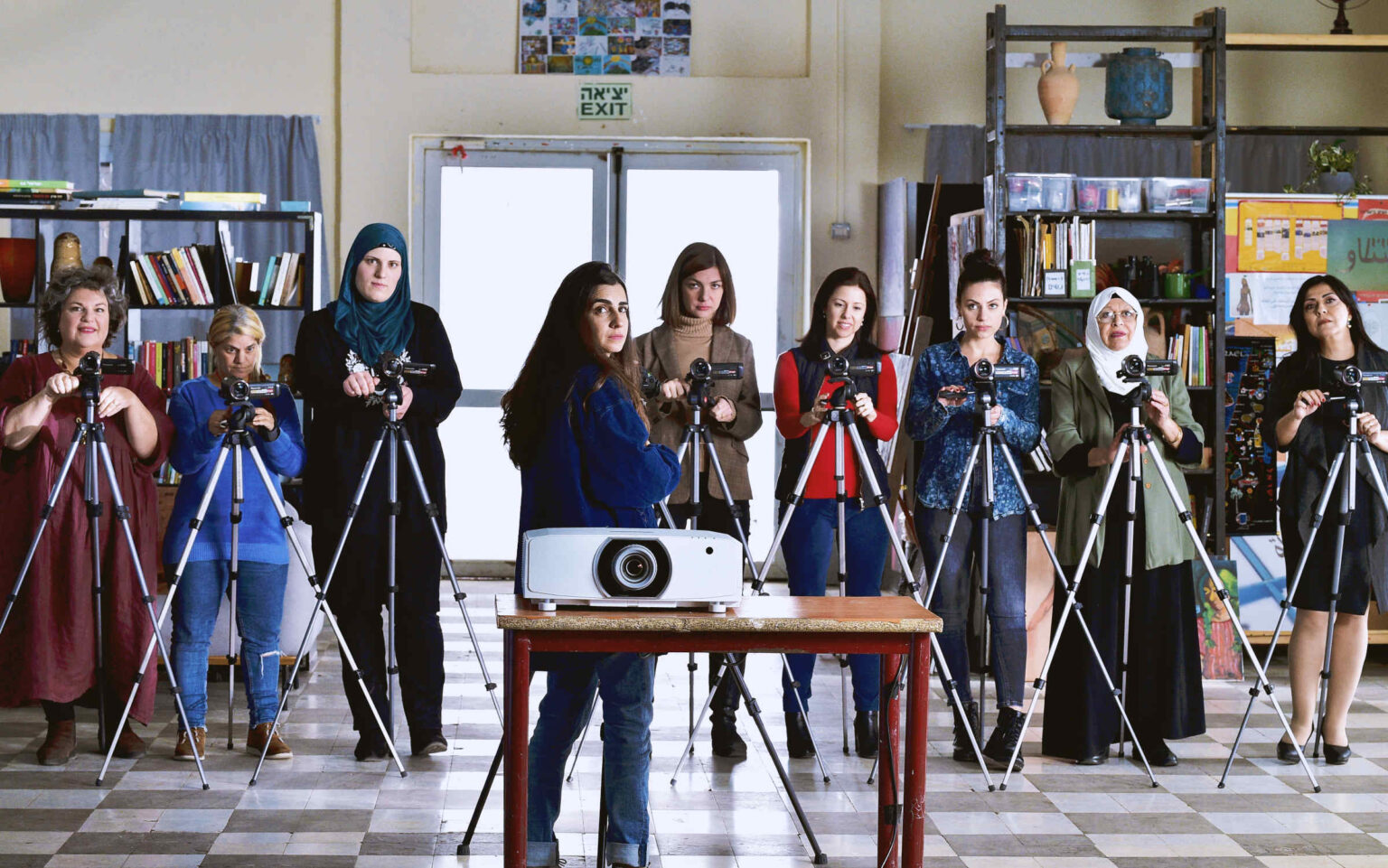
Orit Fouks Rotem presents ‘Cinema Sabaya’ as Israel’s Academy Awards submission
Cinema Sabaya, has been named Israel’s official submission for the 95th Academy Awards International Feature Film Category.
Based on true stories of real women.
Green Productions, Neon Rouge, Kino Lorber, Memento International present
with the support of Israeli Film Fund, Wallonia-Brussels Federation, The Weil-Bloch Foundation, The New Fund for Cinema and Television, Israel Film Council and The Ministry of Culture and Sports, United King Films, The Israel Lottery Council for Culture & Arts and Other Israel
Winner of 5 Ophir Awards including Best Film
Israel’s Official Oscars Entry 2023
CINEMA SABAYA
Written & Directed by Orit Fouks Rotem
The film was created by Jewish and Arab women in collaboration. It portrays the Israeli reality by telling a “simple” story of Arab and Jewish women’s living in 2022 Israel and their everyday lives and struggles. In a way no scholar, politician or organisation can do.
The film is a reverse mirror of what is reflected by the results of the Israeli elections – the nationalism, the hatred of the other. In a country whose parliament has less than 10% representation of women, a film by women about women tells a different story.
Cinema Sabaya, a film by Orit Fouks Rotem, takes place in a small-town community center, where a young filmmaker (Dana Ivgy) teaches a video workshop. Equipping the eight participants – Arab and Jewish mothers, daughters, and wives – with cameras, she sends them out into the world to document their lives.
The footage they create and bring back to the workshop portrays *the drama of everyday life in Israel’s contemporary reality*. It unravels the women’s complex stories and different perspectives around the daily dilemmas that preoccupy almost every woman’s mind – financial freedom, motherhood & relationships, sexual assault, self-realization, sexuality, and more. As they share their footage and stories with fellow participants, the film moves effortlessly between the gravity of their conversations – and the genuine joy generated by the unlikely group of women.
The winner of several Ophir Awards, Cinema Sabaya is Israel’s official entry to the 2023 Academy Awards. Interweaving traditional fiction with a documentary feel & authenticity, it is expected to attract an even larger number of viewers in the new, post-election reality.
FILM TRAILER:
Trailer – https://www.youtube.com/watch?v=rH7apfNazfA
Overview:
A young filmmaker teaching a workshop in a community center puts cameras into the hands of eight women, Arab and Jewish, and asks them to film their lives.
As they share their footage, barriers are broken down, beliefs are challenged, and the women learn more about each other… and themselves.
SYNOPSIS
A group of Arab and Jewish women attend a video workshop at a small town community center run by Rona, a young filmmaker from Tel Aviv, who teaches them to document their lives. As each student shares footage from her home life with the others, their beliefs and preconceptions are challenged and barriers are broken down.
The group comes together as mothers, daughters, wives, and women living in a world designed to keep them apart, forming an empowering and lasting bond as they learn more about each other… and themselves.
Inspired by writer/director Orit Fouks Rotem’s own experiences as a teacher, Cinema Sabaya presents a deft and heartfelt portrait of art’s capacity to unite disparate communities, moving effortlessly between the gravity of their conversations and the genuine joy generated by this unlikely group of friends.
Winner of five Ophir Awards including Best Picture and Best Director and Israel’s Official Submission to the 95th Academy Awards.
DIRECTOR – Orit Fouks Rotem
Orit was born in Israel in 1983. She graduated from the Jerusalem Sam Spiegel School with honors in 2012, winning her class’ ‘Promising Director’ Award. Her diploma film “Staring Match” was screened in festivals all over the world, including: San Sebastian, Montreal, Munich and won the Grand Prix award at the Hangzhao Festival in China, Best Screenplay Award at Tel Aviv Student Film Festival, and an Honorable Mention at the Jerusalem Film Festival.
After graduating, Orit co-directed a documentary series for the Israeli Channel YES Doco; worked as a film facilitator and director for Israeli NGO, making films with at-risk youth; worked as a filmmaking teacher of groups of women in Acres and Givat Haviva. She also conducted research for a documentary by the Oscar-award-winning director Alex Gibney, and wrote and directed two short fiction films – “You Remain Silent“, that was a part of the Abraham Heffner tribute “Voice Over” and premiered in Sarajevo and Jerusalem Film Festival 2018 and The MOMA, and “Veil” that that was selected to various festivals around the world including The Oslo Short Film Festival, Jerusalem Film Festival and Brussels Short Film Festival.
Cinema Sabaya, Orit’s Debut feature film, won 5 Ophir (Israeli Film and TV Academy) Awards for Best Picture, Best Director for Rotem, and Best Supporting Actress for Joanna Said. The film also received Best Picture Award and Audience Award at the Jerusalem International Film Festival. Cinema Sabaya is the official Oscars® entry for Israel.
FILMOGRAPHY:
2012 – Staring Match ( Drama, 20 min) – Was screened in festivals all over the world, including: San Sebastian, Montreal, Munich and won the Grand Prix award at the Hangzhou Festival in China, Best Screenplay Award at Tel Aviv Student Film Festival, and an Honorable Mention at the Jerusalem Film Festival.
2018 – You Remain Silent (Drama, 10 min) – The short was part of the Abraham Heffner tribute film, “Voice Over” and premiered in Sarajevo and Jerusalem Film Festival 2018 and The MOMA.
2019 – Veil (Drama, 20 min) – Selected for The Oslo Short Film Festival, Jerusalem Film Festival, Brussels Short Film Festival and various other festivals around the world. The film was also nominated for an Israeli Oscar award.
DIRECTOR’S NOTE
I drew inspiration from the film five years ago when my mother (who works as Hadera’s Mayor’s Gender Affairs Consultant) took a part in a group of Arab and Jewish women who learned photography together.
It was an enrichment course that gave them feminine empowerment and brought their hearts closer. The platform of videography course is the perfect window for me to gain a look into the world of the women in my film.
Following up to the writing of the script I initiated a number of courses for women, Jewish and Arab, in cities like Acres and Givat Haviva.
I was exposed to so many different worlds of women with gripping life stories who forgot that they can, and deserve to, dream.
I saw up-close what the camera allows them to do and how seeing themselves on the big screen affects them – how deeply they can see into themselves.
In the casting process we chose women that aren’t, mostly, professional actresses and we chose those who had a thematically similar personal stories with likeness to the characters they’ll embody. One of the things that incited me during the writing process was the purpose to include in my first film many women from different backgrounds and to show their life in their full complexity, pausing on the difference and similarities between Arab and Jewish women.
The themes that arise from the women’s stories aren’t highly dramatical, in a sense of life and death, but they resurface daily dilemmas that preoccupy almost every women’s mind – financial freedom, motherhood, sexual assault, self-realization and more.
SELECTED PRESS & REVIEWS
“This is what happens when Film meets Life. Accurate, authentic and deeply moving.” – Dr. Smulik Duvdevani, Ynet
“A brilliant Masterpiece!” – Dr. Avner Shavit, Walla
“Expressive and entirely authentic… Rotem’s film rewards audiences with many intensely charged and poignant moments!” – David Shem-Tov, Jewish Film Reviews
“Cinema Sabaya shows what engaged Israeli filmmaking can achieve, dealing with Jewish and Arab lives in a deep and precise way, and showing the possible realities within Israel.” – Eitan Nechin ,Haaretz
“The movie is well-paced and so engaging that it begins to resemble a Middle Eastern version of the television series, Orange is the New Black, as it brings together a group of women from different ethnicities and backgrounds.” – Hannah Brown, The Jerusalem Post
Jury remarks JFF – “A film that crosses borders and genres, full of emotion and human love. There is a lot of wisdom in the way the film is structured. It does not touch on weighty issues, deliberately skipping between the drops. A rich image of a multi-faceted, cross-age and originally feminine experience, authentic, complex and incredibly poetic.”
PRODUCTION COMPANIES BIO FILMO
GREEN PRODUCTIONS – Israel
Green Productions specializes in developing and producing quality content for television and film.
With offices in Israel and Australia/NZ, we have extensive experience in International co-productions, working with countries such as: Germany, France, Belgium, Poland, Brazil, Colombia, Canada and the US.
Green Productions is home to film and TV makers. Committed to identifying and nurturing new talent alongside working with acclaimed auteurs. We look to bring to the screen emotionally charged stories, told with a unique and authentic voice. We are keen on bold, contemporary stories that capture the spirit of the times while offering an original and fresh look at our reality.
Among the Films and TV Series we have produced are: One on One (starring Tomer Capon for Kan 11), Cinema Sabaya (Winner of 5 Israeli Academy awards including Best Film, Israel’s official Oscars Entry 2023, Best Debut and Audience Award JFF 2021, NETPAC award Warsaw IFF), Saving Shuli (broke Israel’s 20 year viewership records in 2021 , becoming the third most successful Israeli film of all time), Scaffolding (Cannes Acid & TIFF 2017, JFF 2017 Best Film award), Menashe (Israeli co producers Sundance & Berlinale 2017, distributed by A24), Youth (Berlinale 2013), and Summer Vacation (Sundance 2013, shortlisted for Oscars®).
NEON ROUGE – Belgium
Founded in 2002 by Aurélien Bodinaux, Neon Rouge Production is built on the desire to promote documentary and fiction films of a higher quality. Based in Belgium, we discover and mentor filmmakers from Europe and internationally, developing new and original projects with them. Our editorial line offers a different view on humanity. We conceive our projects with respect to the realities they are drawn from. Our most recent titles include: Downstream to Kinshasa (2020) Cannes; Stories Keep Me Awake At Night (2020) PÖFF; Valley of Souls (2019) Marrakesh, Busan; The Mercy of the Jungle (2018) Toronto, FESPACO. At present, we are also co-producing the following projects: Captain Mbaye (Belgium, France, Rwanda, Senegal); Une Histoire du Franc CFA (Belgium, France, Senegal); Cinema Sabaya (Belgium, Israel).
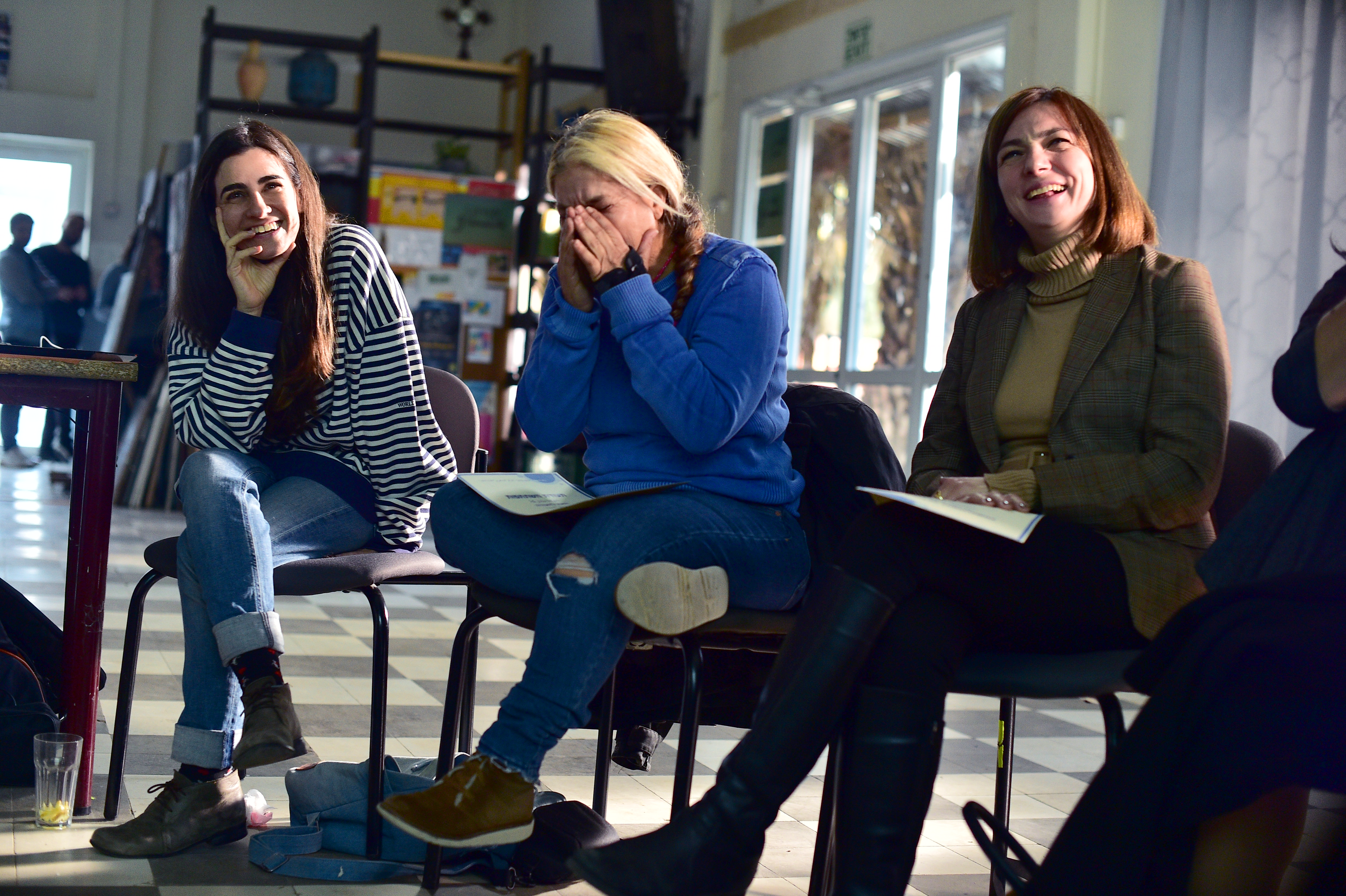
CAST
Dana Ivgy
Joanna Said
Amal Murkus
Ruth Landau
Yulia Tagil
Marlene Bajali
Aseel Farhat
Orit Samuel
Liora Levi
Khawlah Hag Debsy
CREW
Scriptwriter: Orit Fouks Rotem
Director: Orit Fouks Rotem
Producers: Maya Fischer, Gal Greenspan, Roi Kurland
Co Producers: Aurélien Bodinaux, Rhian Vialva
Director of photography: Itay Marom
Editor: Neta Dvorkis
Executive Producers: Moshe Edery, Ori Eisen
Co Producer: Roni Shamiss
Associate Producer: Adi Bar Yossef
Script Editor: Ayelet Menahemi
Casting Director: Emmanuelle Mayer
Original Music: Karni Postel
Supervising Sound Editor: Shahaf Wagshall
Sound Design: Julien Mizac
Sound Mix: Jean-François Levillain
Art Director: Hefi Bohem
Costume Design: Rachel Ben Dahan
Makeup Artist: Orly Ronen
Look Development: Tomer Bahat
Color Grader: Gregor Pfüller
Post Production Supervisors: Ayelet Michaeli Walk, Shiran Yalovich Sheleg Head of Development: Yael Benaya, Gili Zolty
Production companies: Green Productions (Israel) Neon Rouge (Belgium)
DIRECTOR’S INTERVIEW
The film feels very authentic and natural, how did you come up with this concept? Is it based on real life experiences?
The film is based on research I conducted. My mother was part of a similar group of women, and that was what gave me the idea for this film. As a part of my research which later developed into a script, I collected groups of Jewish and Arab women, taught them how to use video cameras and how to tell their stories through filming. The stories of the women in the film are based on themes and ideas that had come up during these sessions with the different groups of women. I altered some details to protect the real women’s privacy. Some of the actresses cast in the film were an inspiration to me as their own being, and so we built some stories around stories from their lives. The authenticity of the film stems from in depth work with each actress on their character and very few rehearsals. We also used two cameras to capture the moments and not have to recreate them from different angles. The script served as a guideline but the women were free to use their own language. Most of the video footage was shot by them, and footage shown by each woman on each session in the classroom/set was footage that the participants were seeing and reacting to it for the first time. This allowed us to get the most authentic, non-reproduced reactions.
What was the casting process like and are all the characters professional actresses? The cast is composed of professional actresses as well as actresses with no acting experience. The casting process was thrilling and constantly had me going back to the script, re-writing to fit the characters we’d cast. We saw dozens of women from all over the country. The casting also changed the members of the group, at first there was to be another character in the film, but when I met Joanna, who plays Souad, one of the characters whose difficult day to day life is slowly revealed in the film. She was originally written as two different characters but I realized it’s better to merge that character to one and allow her to carry both of their stories. The auditions were part meeting and improvising and part scripted. The process was very long and comprehensive and improved my understanding of how I want to direct this film, and what sort of approaches I should avoid. For example, I understood that each time we used the written text something of the authenticity was lost, and was able to let go of the initial text, allowing the women to interpret its intentions and say it in their own words. As a result, the film has both scripted and improvised moments alongside.
These women work through their similarities and differences through the appreciation of each other’s video work, do you believe filmmaking can be a tool to bridge the gap of differences?
I think there is a directness in looking at yourself and others through the lens of the camera. It shows you the strong reality which is hard to dismiss or ignore. With cinematic tools this reality can also be very emotion stirring. I definitely think that collaborative filmmaking can raise a deep and honest discourse that can create compassion and empathy. Can it bridge the gaps? That’s a big question, instinctively I feel it can, but of course the circumstances of the life around us carry a larger weight.
Did you encounter any taboo issues in your filmmaking process?
During the casting process I encountered women who wanted to act but their spouses and families wouldn’t allow it. There was an actress who read the script, and since there is talk of lesbians, she canceled her participation in the film fearing this will be perceived as un-decent. From the actresses eventually cast I hadn’t encountered any taboos, but a high sensitivity to how they would be portrayed, and what is and isn’t discussed in the film. At the beginning some of them felt they were just a representation and not a character in their own right. On my end this wasn’t true and this isn’t what I want to come across to the audience. We are all a type of representation of the class and place we come from, but first and foremost, I see each character as distinct, unique, with inner contradictions and not as a stereotype, none of the characters stand as a general representation of an Arab or Jewish woman, a battered woman or a lesbian, they can be all of these things but in addition to a whole personality and not just as a label.
Are the stories told based on their lives? Were the lines mainly scripted or there’s improvisation? Some of the characters used themes from their own lives, obscured to protect their privacy, and some of the characters play someone who is completely different from who they are (to possible extent, since I believe each actress brings a variation of herself to the role).. The script was completed pre-casting and though it changed during the casting process, the narrative was determined and re-written while working with the actresses. It was clear to me where we start and where we will end, but not exactly what will fill the frame from the starting to ending point. As for the character of Rona, she originally had a much larger story in the script and was going through a similar process to the other characters, but the actress who played her and myself felt there was a lot of forcing in her story that wasn’t necessary for the film. This isn’t a film with one heroine undergoing change, but a film about a group whose leader is a character within her own right – who’s story eventually allows the women to shine. Rona comes with a will. The will to create a film, which evolves and intensifies as she gets to know the women better. This of course correlates with my making of this film.
These women see themselves in a different light through their own creative input, was that your goal to also empower representations of women through this film?
Choosing women who work from a municipality was a choice predetermined to hold diversity. A municipality is a sort of microcosm, it has the legal counsel beside the social worker beside the librarian, the old versus the young. I was interested in dealing with femininity as a whole rather than a specific age or class, I felt this deepens the themes I wanted to touch upon and allows me to deal with them with a wider approach.
The film happens almost in one location only, did you find it challenging? What does this place represent in your opinion?
The fact that it is one location helped greatly with the ‘bubbled’ feeling I wished to create and use to cultivate intimacy and a sense of openness and safety. This focused the energy and attention of the actresses, and helped build the group, which was one of my biggest challenges feeling that there is an actual group building and bonding. This also allowed us to shoot the film chronologically and with few shooting days. So as I see it there were many advantages to this choice. This was also what the story was in my eyes – the room as a center gravitating the women together. This place represents a meeting place, a space which serves as a womb wrapped around the women who grow and get to know each other and themselves. A place where the viewer does not know where he is, in Jewish women territory, or Arab. A neutral place, a community center of coexistence activities. Visually I was worried the film wouldn’t be interesting enough, but once I cast the women, I felt their faces would be the true location and trusted them to be riveting.




